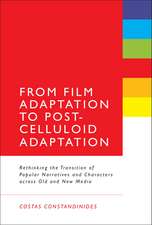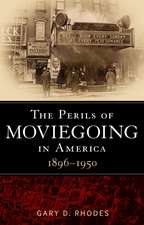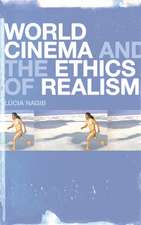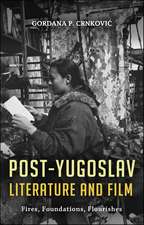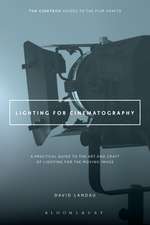Guillermo del Toro: Film as Alchemic Art
Autor Keith McDonald, Roger Clarken Limba Engleză Paperback – 26 aug 2015
| Toate formatele și edițiile | Preț | Express |
|---|---|---|
| Paperback (1) | 256.77 lei 6-8 săpt. | |
| Bloomsbury Publishing – 26 aug 2015 | 256.77 lei 6-8 săpt. | |
| Hardback (1) | 714.92 lei 6-8 săpt. | |
| Bloomsbury Publishing – 23 apr 2014 | 714.92 lei 6-8 săpt. |
Preț: 256.77 lei
Preț vechi: 295.03 lei
-13% Nou
Puncte Express: 385
Preț estimativ în valută:
49.14€ • 51.11$ • 40.57£
49.14€ • 51.11$ • 40.57£
Carte tipărită la comandă
Livrare economică 15-29 aprilie
Preluare comenzi: 021 569.72.76
Specificații
ISBN-13: 9781501308611
ISBN-10: 1501308610
Pagini: 248
Dimensiuni: 152 x 229 x 13 mm
Greutate: 0.33 kg
Editura: Bloomsbury Publishing
Colecția Bloomsbury Academic
Locul publicării:New York, United States
ISBN-10: 1501308610
Pagini: 248
Dimensiuni: 152 x 229 x 13 mm
Greutate: 0.33 kg
Editura: Bloomsbury Publishing
Colecția Bloomsbury Academic
Locul publicării:New York, United States
Caracteristici
Overview
of
current
developments
in
fantasy
and
the
gothic
in
film
Notă biografică
Keith
McDonald
holds
a
PhD
from
Birkbeck
College,
University
of
London,
UK,
and
is
the
Head
of
Programme
for
Media,
Film
Studies
and
Mass
Communications
at
York
St
John
University,
UK.
His
research
interests
include
popular
culture,
cult
cinema
and
digital
media.Roger
Clark
taught
literature
and
film
in
UK
Universities
for
over
thirty
years
and
has
published
on
contemporary
fiction
and
film.
He
was
Senior
Lecturer
in
Literature
Studies
at
York
St
John
University,
UK,
where
he
is
currently
Honorary
Research
Fellow
in
the
Faculty
of
Arts.
Cuprins
Acknowledgments
IntroductionPart
1Chapter
1.
Influences
and
Intertexts
Chapter
2.
Accented
Fantasy
and
the
Gothic
Perverse
Chapter
3.
Fan
as
FilmmakerPart
2Chapter
4.
Twisted
Genres:CronosandMimicChapter
5.
Trauma
-
Childhood
-History:The
Devil's
BackboneandPan's
LabyrinthChapter
6.
Gothic
Superheroes:Blade
II,HellboyandHellboy
II:
The
Golden
ArmyChapter
7.
From
Development
Hell
to
the
Pacific
Depths:The
StrainandPacific
RimBibliography
Filmography
and
Comicography
Index
Recenzii
As
a
scholar
of
del
Toro
myself,
[after
readingFilm
as
Alchemic
Art]
I
found
my
understanding
of
this
filmmaker
enriched
by
readings
of
his
works
that
I
had
never
considered
and
furthermore,
my
comprehension
of
contemporary
auterism
expanded.
[...]
McDonald
and
Clark's
book
lays
a
solid
foundation
for
whatever
work
may
follow
in
this
impressive
and
comprehensive
reading
of
del
Toro's
cinema.
In this study, McDonald and Clark achieve a comprehensive and scholarly examination of the director and his cinema. In a thoroughly researched account of del Toro's literary and cinematic influences, his experimentation with genre, the trans-national quality of his work and his self-identification as a fan, the authors build a sharp and fascinating portrait of del Toro. To this they add a series of lucid and critical readings of the director's films that show an admirable command of del Toro's multi-generic and multicultural points of reference. Building the study around the apposite metaphor of del Toro as alchemist, McDonald and Clark's study captures the person and the work brilliantly, combining exhaustive research with an evident enthusiasm for the subject matter. The result, as alchemical as del Toro's cinema, is an in-depth yet highly approachable book that will appeal to scholars and fans alike.
A lucid, rigorous mid-career study of Guillermo del Toro's films,Guillermo del Toro: Film as Alchemic Artis critical reading for students and scholars of del Toro's cinematic oeuvre. McDonald and Clark situate del Toro's films as transnational, hybrid narratives informed by traditional and non-traditional styles as well as the fantasy and horror genres and auteurist tradition. The result is a nuanced portrait of the transformative nature or "alchemic art" of del Toro's narratives, which the authors point out feature "counter-narratives," non-Hollywood endings, and imagery that is alternately brutal and beautiful. This hybrid, "accented" cinema illustrates the mystery, violence, and transformations inherent in the stories del Toro tells.
This is as good an account of del Toro's influences, preoccupations and films as one could hope for. It combines detailed analysis of the films with a wide-ranging examination of the cultural context of his work, including cinematic, literary and artistic influences, as well as considering him from the perspectives of transnational cinema, queer cinema, and the rich relationship that he has with the world of fandom. A well informed, lucid and stimulating study.
In this study, McDonald and Clark achieve a comprehensive and scholarly examination of the director and his cinema. In a thoroughly researched account of del Toro's literary and cinematic influences, his experimentation with genre, the trans-national quality of his work and his self-identification as a fan, the authors build a sharp and fascinating portrait of del Toro. To this they add a series of lucid and critical readings of the director's films that show an admirable command of del Toro's multi-generic and multicultural points of reference. Building the study around the apposite metaphor of del Toro as alchemist, McDonald and Clark's study captures the person and the work brilliantly, combining exhaustive research with an evident enthusiasm for the subject matter. The result, as alchemical as del Toro's cinema, is an in-depth yet highly approachable book that will appeal to scholars and fans alike.
A lucid, rigorous mid-career study of Guillermo del Toro's films,Guillermo del Toro: Film as Alchemic Artis critical reading for students and scholars of del Toro's cinematic oeuvre. McDonald and Clark situate del Toro's films as transnational, hybrid narratives informed by traditional and non-traditional styles as well as the fantasy and horror genres and auteurist tradition. The result is a nuanced portrait of the transformative nature or "alchemic art" of del Toro's narratives, which the authors point out feature "counter-narratives," non-Hollywood endings, and imagery that is alternately brutal and beautiful. This hybrid, "accented" cinema illustrates the mystery, violence, and transformations inherent in the stories del Toro tells.
This is as good an account of del Toro's influences, preoccupations and films as one could hope for. It combines detailed analysis of the films with a wide-ranging examination of the cultural context of his work, including cinematic, literary and artistic influences, as well as considering him from the perspectives of transnational cinema, queer cinema, and the rich relationship that he has with the world of fandom. A well informed, lucid and stimulating study.





